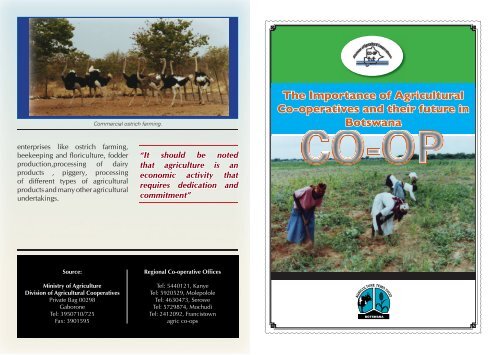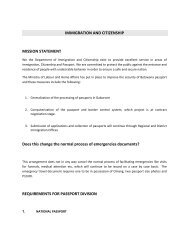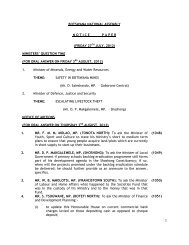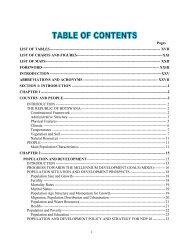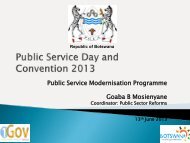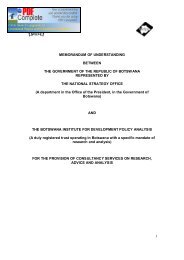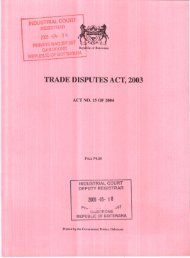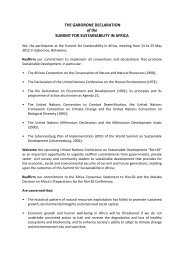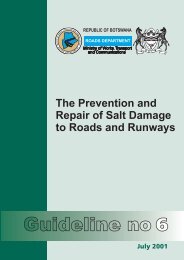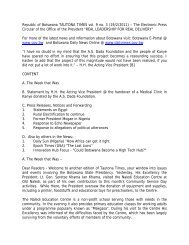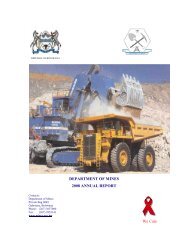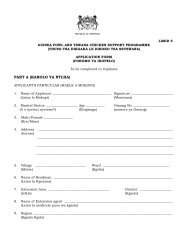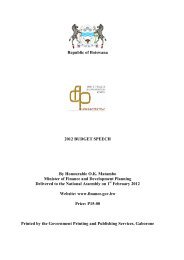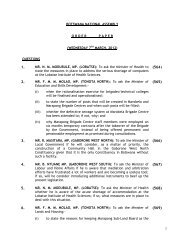The Importance Of Agricultural Co-operatives And Their
The Importance Of Agricultural Co-operatives And Their
The Importance Of Agricultural Co-operatives And Their
You also want an ePaper? Increase the reach of your titles
YUMPU automatically turns print PDFs into web optimized ePapers that Google loves.
<strong>Co</strong>mmercial ostrich farming.<br />
enterprises like ostrich farming,<br />
beekeeping and floriculture, fodder<br />
production,processing of dairy<br />
products , piggery, processing<br />
of different types of agricultural<br />
products and many other agricultural<br />
undertakings.<br />
“It should be noted<br />
that agriculture is an<br />
economic activity that<br />
requires dedication and<br />
commitment”<br />
<strong>The</strong> <strong>Importance</strong> of <strong>Agricultural</strong><br />
<strong>Co</strong>-<strong>operatives</strong> and their future in<br />
Botswana<br />
CO-OP<br />
OP<br />
Source:<br />
Source:<br />
Ministry of Agriculture<br />
Ministry Division of of Agriculture <strong>Agricultural</strong><br />
Division of <strong>Agricultural</strong> <strong>Co</strong>-<strong>operatives</strong> <strong>Co</strong><strong>operatives</strong><br />
Private<br />
P.0<br />
Bag<br />
Box<br />
00298<br />
86<br />
Gaborone<br />
Gaborone<br />
Tel: 3950706/725<br />
Tel: 3950710/725<br />
Fax: 3951657<br />
Fax: 3901595<br />
Regional <strong>Co</strong>-operative <strong>Of</strong>fices<br />
Regional <strong>Co</strong>-operative <strong>Of</strong>fices<br />
Tel: 5440227, Kanye.<br />
Tel: Tel: 5920529, 5440121, Molepolole. Kanye<br />
Tel:<br />
Tel:<br />
5920529,<br />
4630473,<br />
Molepolole<br />
Serowe.<br />
Tel:<br />
Tel:<br />
4630473,<br />
5729874,<br />
Serowe<br />
Mochudi.<br />
Tel:<br />
Tel:<br />
5729874,<br />
2412092,<br />
Mochudi<br />
F/town.<br />
Tel: 2412092,<br />
agric co-ops<br />
Francistown<br />
agric co-ops
AGRICULTURAL CO-OPERATIVES<br />
A co-operative is defined by<br />
Ewell P. Roy (1964), as a business<br />
that is organized, capitalized and<br />
managed for its member patrons,<br />
furnishing and/or marketing<br />
goods and services to the patrons<br />
at cost. It should be noted that the<br />
primary purpose of a co-operative<br />
is to make profit for the member<br />
patrons. This means that the<br />
profit harvested is given back to<br />
the member farmers who utilize<br />
the services of a co-operative.<br />
That is why co-<strong>operatives</strong> are<br />
regarded as non- profit making<br />
organizations.<br />
History of <strong>Agricultural</strong><br />
<strong>Co</strong>-<strong>operatives</strong><br />
<strong>Agricultural</strong> <strong>Co</strong>-<strong>operatives</strong> in<br />
Botswana started way back in<br />
1964 by Serowe Marketing <strong>Co</strong>operative<br />
whose major purpose<br />
was to sell <strong>Agricultural</strong> Inputs<br />
and market farmers’ livestock to<br />
Botswana Meat <strong>Co</strong>mmission. Later<br />
many more <strong>Agricultural</strong> Marketing<br />
<strong>Co</strong>-<strong>operatives</strong> emerged and spread<br />
all over the country. <strong>The</strong> oldest<br />
Horticultural <strong>Co</strong>-operative is<br />
Kolobeng Horticultural <strong>Co</strong>-operative<br />
Society, which was registered in<br />
1975. <strong>The</strong>re were very few Crop<br />
Production <strong>Co</strong>-<strong>operatives</strong> as well as<br />
Dairy and Small Stock <strong>Co</strong>-<strong>operatives</strong><br />
by then since there was no market<br />
for them.<br />
<strong>The</strong> population was still small and<br />
almost every household could<br />
produce those goods for subsistence.<br />
It was very cheap to produce during<br />
those times. Now things have<br />
taken a different dimension. <strong>Co</strong>st<br />
of production has gone very high<br />
hence high capital investment. This<br />
means that no ordinary Motswana<br />
can afford to stand alone to produce<br />
commercially and sustainably. We<br />
need each other.<br />
in numbers. Because these cattle<br />
speculators had the financial<br />
strength and management<br />
expertise, they had a competative<br />
advantage over co-<strong>operatives</strong>.<br />
<strong>The</strong> third reason was related to<br />
beef prices offered by the major<br />
market which farmers considered<br />
low and non motivational.<br />
<strong>The</strong> fourth reason was that<br />
investors consider agriculture as<br />
a very risky undertaking due<br />
to negative effects of drought,<br />
diseases and other natural<br />
disasters.<br />
Where we want to go<br />
<strong>The</strong> situation has now taken a<br />
different dimension. All that have<br />
been threats to co-<strong>operatives</strong> have<br />
now turned in to opportunities.<br />
Farmers are once again beginning<br />
to realize the need to come<br />
together and form production<br />
and marketing co-<strong>operatives</strong>. <strong>The</strong><br />
Botswana Export Development<br />
and Investment Authority (BEDIA)<br />
is also weeding the ground for<br />
export opportunities, and it is<br />
upon co-<strong>operatives</strong> to utilize them<br />
by venturing into non- traditional<br />
2 7
<strong>Agricultural</strong> <strong>Co</strong>-<strong>operatives</strong>: <strong>The</strong> key to<br />
Poverty Reduction and Employment Creation<br />
Who should go into<br />
<strong>Agricultural</strong><br />
<strong>Co</strong>-<strong>operatives</strong><br />
Everybody who would like to<br />
benefit from the advantages may<br />
go in to co-<strong>operatives</strong>. Women<br />
and youth must take the lead.<br />
“Lefatshe le thata ka basadi ba<br />
lone”, so says the Setswana<br />
song.<br />
Why <strong>Agricultural</strong><br />
<strong>Co</strong>-<strong>operatives</strong><br />
Social impact<br />
<strong>Co</strong>-<strong>operatives</strong> impact positively<br />
on members lives to which they<br />
Modern mechanized arable farming equipment.<br />
4<br />
belong. As groups, a number<br />
of farmers have, over the years,<br />
reduced the effects of hunger<br />
and poverty by engaging in<br />
small agricultural production<br />
institutions.<br />
As nations, and indeed the<br />
Botswana Government, has waged<br />
war against poverty. <strong>Agricultural</strong><br />
<strong>Co</strong>-<strong>operatives</strong> are a vehicle through<br />
which poverty reduction measures<br />
are taken. Small as they may seem,<br />
they provide a daily meal for the<br />
members. Most members of these<br />
groups do not receive government<br />
handouts and are not classified as<br />
destitute. This reduces the burden<br />
on government who would<br />
otherwise provide for them.<br />
Small agricultural co-<strong>operatives</strong><br />
mean a lot to the members. It can<br />
be agreed that their continued<br />
existence is a clear indication that<br />
they have a social<br />
meaning to the<br />
members.<br />
<strong>Co</strong>nsider a<br />
small cattle<br />
marketing<br />
cooperative<br />
w h i c h<br />
has been in<br />
existence for<br />
forty-two (42)<br />
years, which<br />
neither<br />
m a k e s<br />
profit nor<br />
losses. <strong>The</strong><br />
underlying<br />
reason<br />
behind this<br />
scenario is that<br />
the co-operative<br />
serves a poor small farmer in the<br />
rural area to give him a chance to<br />
5<br />
sell his two cattle to BMC, without<br />
being exploited by the middle<br />
man. This is the responsibility that<br />
co-<strong>operatives</strong> have toward their<br />
members. <strong>The</strong>y tend to fill the void<br />
in the rural areas, i.e. In many<br />
cases they are found where<br />
profit driven investors<br />
would not dare to go.<br />
This is a remarkable<br />
development in the<br />
lives of the rural people,<br />
and in particular, the<br />
small farmer.<br />
Economic Impact<br />
Economics, as a social<br />
science is about the<br />
exploitation and wise<br />
use of the countries<br />
resources. <strong>Agricultural</strong> <strong>Co</strong><strong>operatives</strong><br />
ensure that even<br />
the small farmer participates in<br />
the economic development of the<br />
country. How is this realized?
Small as you are, you can go into agro-business in<br />
partnership with others and contribute to Botswana’s<br />
Self Sufficiency in Food Production<br />
1. Livestock Marketing<br />
<strong>Co</strong>-<strong>operatives</strong><br />
A collection of ones and twos<br />
leads to hundreds. It has once<br />
been on record that co-<strong>operatives</strong><br />
were the highest single supplier<br />
of livestock to BMC. <strong>The</strong> high<br />
throughput share is a result of<br />
the use of co-<strong>operatives</strong> by small<br />
individual members who bring<br />
their small numbers together and<br />
sell to the abattoir. In doing so,<br />
the BMC is able to sell to the<br />
lucrative European Union (EU)<br />
market and the result is an inflow<br />
of funds in to the economy.<br />
2. Arable/Crop Production<br />
<strong>Co</strong><strong>operatives</strong>.<br />
Likewise, small horticultural<br />
concerns participate in the<br />
development of the economy<br />
by reducing the quantities of<br />
vegetables that could otherwise<br />
be imported. <strong>The</strong> existence of this<br />
institution results in a reduced<br />
outflow of funds for purchase of<br />
6<br />
vegetables outside the country.<br />
It might be insignificant, but the<br />
accumulated savings become<br />
significant.<br />
Economic participation by citizens<br />
does not only mean engaging in<br />
large enterprises.<br />
Even small enterprises (micro) are<br />
a force to reckon with.<br />
<strong>The</strong> future of <strong>Agricultural</strong><br />
<strong>Co</strong>-<strong>operatives</strong> in Botswana<br />
Where we come from<br />
After independence, agricultural<br />
co-<strong>operatives</strong> were growing at<br />
an increasing rate and in the<br />
late eighties, their growth started<br />
to slow down. This was due to<br />
different reasons, some of which<br />
were the droughts, which took<br />
several years from 1980 till late<br />
nineties. Another major reason<br />
being that other cattle agents<br />
other than co<strong>operatives</strong> began to<br />
realize business potential in cattle<br />
marketing hence they increased<br />
Advantages of <strong>Co</strong>-<strong>operatives</strong><br />
<strong>Co</strong>-<strong>operatives</strong> are a key to the<br />
development of people both<br />
at grass root level and middle<br />
level. In order to survive in<br />
the globalization era, farmers<br />
need to join efforts to be able<br />
to compete with giants and<br />
penetrate the markets. In co<strong>operatives</strong>,<br />
farmers have the<br />
opportunity to:<br />
* Share capital<br />
for investment<br />
* Share the production<br />
and market risks<br />
* Share responsibility<br />
and accountability<br />
* Share the benefits<br />
* Share ideas<br />
Women removing weeds in a horticultural field.<br />
3<br />
With <strong>Co</strong>-<strong>operatives</strong>, you<br />
don’t need huge sums of<br />
money to start an agrobusiness,<br />
only determination<br />
and co-operation.<br />
<strong>Agricultural</strong> <strong>Co</strong>-<strong>operatives</strong> are<br />
a key to successful agricultural<br />
Industry.<br />
Remember the new technologies<br />
for agricultural production and the<br />
need to produce enough to feed the<br />
nation and even export. That is not<br />
easy for one man.


